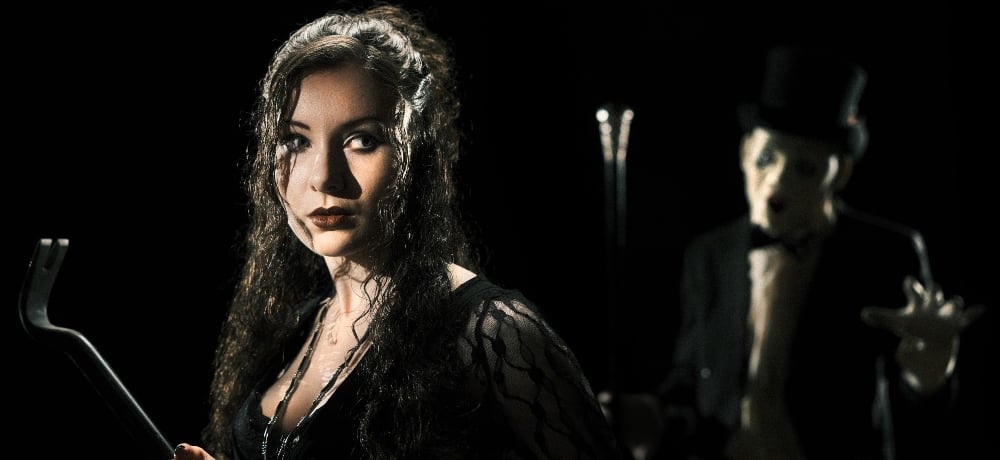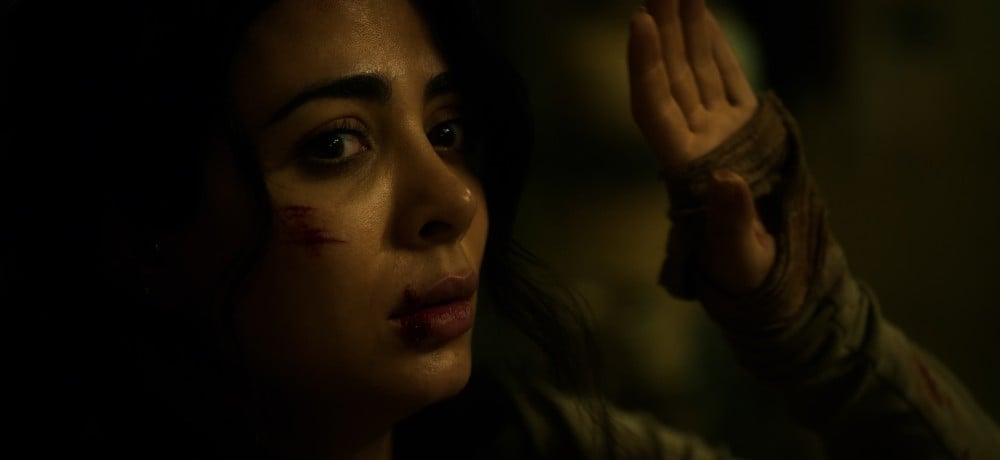






Felipe Vargas' pared-back debut strives to echo classic Mexican horror films like El Vampiro or La Llorona, but Rosario's closest relation is Keith Thomas' Jewish afterlife tale, The Vigil. Both films, despite their cultural idiosyncrasies, trap protagonists in a claustrophobic New York City apartment with a dead body. Where Thomas taps into Orthodox Jewish practices to summon hauntings, writer Alan Trezza chooses the Cuban-born religion of "Palo Mayombe." Tight quarters become a hunting ground for spiritual demons as Vargas preys upon familial guilt. It's applaudably Big Apple-coded and features nifty ghoulish cosmetic effects, but The Vigil burns hotter, and Rosario sometimes feels stuck in place.
Emeraude Toubia stars a Wall Street hotshot, our Rosario, on the blizzardy night of her grandmother's death (played by Costanza Gutierrez). Rosario is the only option available to watch over abuela's corpse before an ambulance can arrive, as she rests peacefully in her chilly NYC apartment. The building's super, Marty (Paul Ben-Victor), escorts Rosario to the unit and leaves her be, with the only other notable commotion coming from a coughing neighbor, Joe (David Dastmalchian). All Rosario has to do is lounge around until help arrives—delayed by the ongoing storm—but it's hardly a simple favor. Rosario soon feels a presence with her, something supernatural, and finds herself fighting against the sins of her family's past.
It's a familiar setup. The Hereditary of it all. Rosario's relationship with granny ended on contentious terms; she died alone and was shunned by loved ones. There's remorse behind the stockbroker's actions, an adult less tethered to her Latinx roots, now grown into an example of the American dream. An immigrant's journey traces back to border crossings to enter a more prosperous country, representing the hardships older generations endured to start anew here in the United States. Vargas and Trezza want to highlight the horrors of gaining access to a promised melting pot that's still non-homogeneous, but do so with a minimalism that's only ever a snapshot.
Claustrophobia is paramount to tension, and Rosario does its best. City officials order a curfew, the subways are closed, and rideshare apps are suspended. Rosario's only refuge is her grandmother's gallows-y dwelling. It's a spacious square footage that allows cinematographer Carmen Cabana to eerily dolly down hallways and anxiously peer around corners, even hiding stoned, dungeon-dark chambers hiding Palo artifacts. But there's an open concept that feels off, and Rosario's instincts are, in moments, curious. The character's motivations and plot mechanisms fixed to keep the frightened granddaughter in place aren't bulletproof, loosening the film's overall grip on inescapable lockbox chills.
Special effects makeup artist KC Mussman imagines a compelling monster. Rosario encounters the festering, witchy-yet-undead foe linked to her deceased abuela, complete with rotten skin and sharpened fingernails. Although the scares themselves feel very haunted maze-y, since the cursed entity pops from under beds, through surfaces, and out of openings like a scare actor. Solid "Boo!" moments are more about a jolt than establishing dreadful atmospheres, and even then, keynote scares remind of other movies in lesser comparisons (a particularly juicy Drag Me to Hell wink). Rosario's only chance against the fiend in such confined corners is to tease attacks over and over, which edges on repetitive, but the craftsmanship put into cosmetic designs and a particular body horror finale boasts solid results.
It's the Palo Mayombe of it all that gives Rosario its uniqueness. The lead character first searches "voodoo" when attempting to pin her grandmother's beliefs, clued by ceremonial pots called ngangas, these ritualistic caldrons used to communicate with spirits. It's a blood sacrifice of a different flavor, and that matters in a read-it-before script like Rosario. Genre fans have witnessed these stories aplenty, but with a fresh coat of mysticism—by acknowledging international horrors kept buried by generic American standards—typical stories can feel refreshed. Vargas doesn't redefine the "hells of home" subgenre, but he does find an inviting entry point.
Rosario is suitable and spooky if also underwhelming. Mileage will vary depending on your familiarity with "trauma horror" and its stranglehold over filmmakers this past… almost a decade? Vargas' feature debut is composed, and Toubia's performance finds fear in overpriced spaces, but it's more than a stone's throw away from exceptional. A tale of doomed bloodlines does its best to be introspective and unsettling, landing somewhere in a curious middle ground not devoid of horror yet lacking in thrills other comparable lineage nightmares have achieved.
Movie Score: 3/5